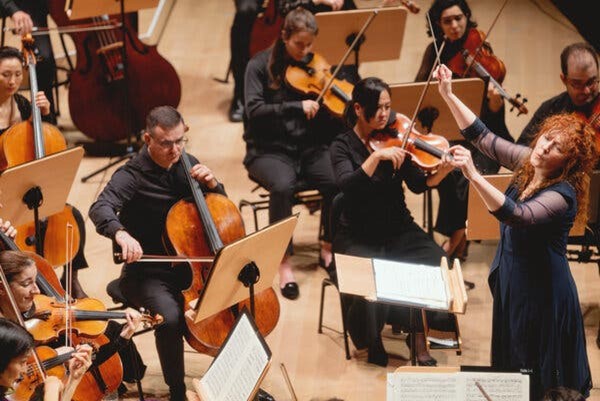By: Eva Li
With a new name and a new music director, Lincoln Center’s summer orchestra is getting a fresh start this season. On the evidence of three concerts over the past week and a half, though, the newly minted Festival Orchestra of Lincoln Center is turning its focus to an element that has always been there: the players themselves.
Last year was the final summer of the Mostly Mozart Festival Orchestra, which for 21 years was led by the beloved Louis Langrée. The renamed ensemble’s music director, Jonathon Heyward, was a companionable host recently at the first concert of its season, which allowed audience members to vote on the pieces they’d like to hear. Between movements, Heyward called on a few players at their music stands to talk about their love of the composers. Some remarks seemed well-rehearsed, others extemporaneous. But all of them were sweet.
There has been some worry about the organization’s legacy — that change represents a repudiation of the orchestra’s repertoire and mission. At his final concerts, Langrée himself pleaded with the audience to return and support the players. This year, the onstage conversations felt calculated to build a rapport between the players and the audience. Attendees were also invited to mingle with the musicians in the lobby of David Geffen Hall after each concert. All that talking had an interesting outcome: It left me more invested in individual musicians when they eventually played.
As in years past, each program was performed twice on consecutive nights. Avoiding heavy material, the concerts felt like a linen suit designed for comfort, ease and a touch of class on balmy days. There’s still substance, but it comes in the pleasing form of Mozart, Mendelssohn and Schumann (a Heyward Favorite), rather than the portentous, densely textured works of Mahler and Strauss.
On July 27, I went to Geffen Hall to hear Kazem Abdullah conduct a program of Brahms’s Violin Concerto, Louis W. Ballard’s “Incident at Wounded Knee” and Stravinsky’s eccentrically witty “Pulcinella.” A couple of days later, Carlos Miguel Prieto similarly didn’t try to force any connections among Haydn’s Symphony No. 49, Peter Lieberson’s song cycle “Neruda Songs” and Alberto Ginastera’s prismatic “Variaciones Concertantes.” And, on Friday, I heard the early-music specialist Jeannette Sorrell lead a program narrowly focused on Mozart and his contemporary Joseph Boulogne.
“Pulcinella” and “Variaciones Concertantes” were highlights, and whether by accident or by design, the pieces had plenty of solo opportunities for the players to shine. With a musical language conscientiously molded from the clay of Baroque music, “Pulcinella” represents Stravinsky’s pivot into Neo-Classicism, a blending of his piquant harmonic and rhythmic styles with the structures and sounds of older eras. From the cutely bumptious overture to the triumphant all’s-well finale, the Festival Orchestra played handsomely, dashing off Baroque felicities with plump horns and fizzy strings. Abdullah downplayed the piece’s intentionally garish, broadly comic moments. Trombone fillips drew audience laughter.
The Ginastera is something of a concerto for orchestra, with soloists taking turns with variations. The ensemble’s principals rose to the occasion. The flutist Jasmine Choi played with impishness as well as body, and the clarinetist Jon Manasse could vacillate between leanness and curvaceousness. The oboist Ryan Roberts, something of an M.V.P. across the concerts, played silkily in his duet with Marc Goldberg’s rich, seamless bassoon. The concertmaster RuggeroAllifranchini’s violin irradiated the peculiar beauty of a rainbow on an oil slick. All the players came together for a sparking finale.
Aside from the Stravinsky and the Ginastera, the other 20th- and 21st-century pieces were a mixed bag. The orchestra seemed wayward in a murky rendition of “Neruda Songs.” Ballard’s “Incident at Wounded Knee,” in its first New York City performances in 25 years, was the opposite: vivid in its depiction of dignity and plaintiveness in the face of an existential threat.
This year’s crop of guest soloists made a muted impression compared with the past two seasons. The quality of the singing in “Pulcinella” varied a bit too widely by Lincoln Center’s standards. In the exquisite “Neruda Songs,” the mezzo-soprano J’Nai Bridges, perhaps distracted by her reliance on the score in front of her, sounded uncertain in the deployment of her opulent voice.
The soprano Sonya Headlam’s pretty tone wavered in held notes and drooped in coloratura passages in Mozart’s radiant “Exsultate, jubilate” and a simple aria from Boulogne’s “L’Amant Anonyme.” Benjamin Beilman played Brahms’s Violin Concerto with a sweetly focused timbre, captivatingly fine phrasing and somewhat blurred rhythms.
Source: https://www.nytimes.com/2024/08/05/arts/music/festival-orchestra-of-lincoln-center.html











